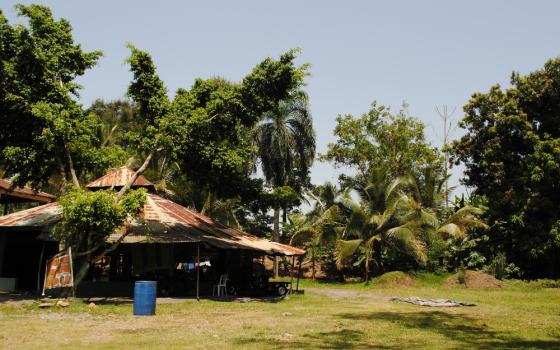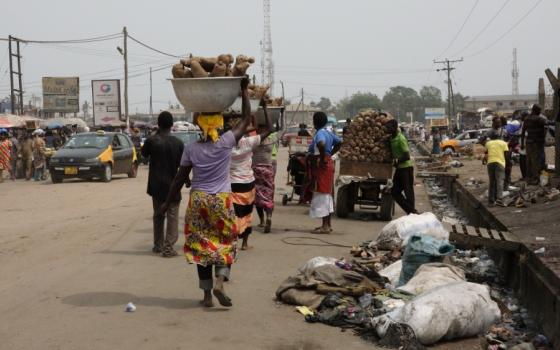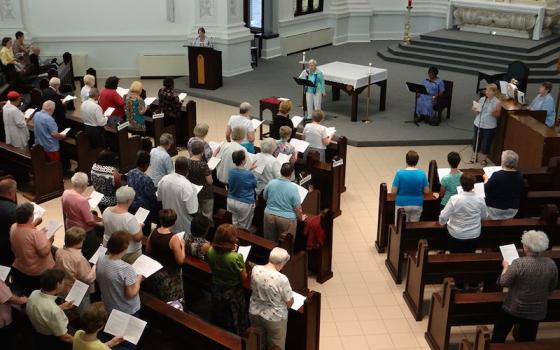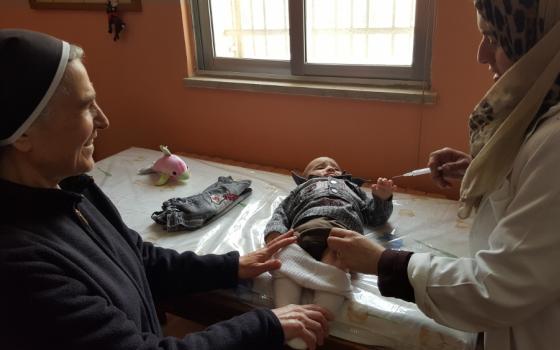At the end of 2015, Global Sisters Report had an all-staff meeting at our headquarters in Kansas City, Missouri, to discuss what 2016 would look like. Where would we go? What would we write about?
Well, we ended up traveling and writing a lot in 2016, and you might have missed some of our favorite coverage. So I have compiled a list of 10 noteworthy stories (and, in some cases, series of stories) in no particular order for you to revisit or even to read for the first time.
See you all in 2017!
On the streets of Sicily, global sisters accompany African migrants by Traci Badalucco, published Sept. 6
What does the future of religious life look like? It could look like the Migrant Project/Sicily, in which sisters of eight nationalities from four continents live and work together to help migrants who have left their homes in Africa to search for a better life in Sicily, Italy. Many of these migrants find themselves in limbo, unable to become citizens (or have legal employment in some cases) but unable to return to Africa, so the sisters do what they can to create relationships and ease homesickness.
The U.S. prison system and how sisters are advocating for a change in policies Four-part series by Dawn Araujo-Hawkins, published April 4-7
It's often assumed that only hardened criminals go to prison, and that it's for public safety that they're kept there. Yet with more than 2 million people behind bars, the United States jails more people per capita than any other country in the world — and it's jailing mostly black men for minor, nonviolent drug offenses, even though they are no more likely to use drugs than white men. Dawn's four-part series examines the racism behind the system and how the sisters are helping both current and former inmates. A must-read series.
Uncovering stories about mining
In 2016, we pushed for more coverage about mining around the world and how sisters are advocating for the Earth. Our mining series, which can be found in total here, included:
- The fight against illegal gold mining in Ghana, where foreign countries have set up mines on church land with no regard to the law or the health of those living nearby.
- Dominicans struggling to protect Loma Miranda, one of the most biodiverse mountains in the Dominican Republic, from international mining interests.
- How community opposition succeeded in shutting down mines in Honduras and Nicaragua, a pyrrhic victory to many people in the towns the mine used to occupy.
Albinism in Africa: Sisters, activists counter violence with education, protection by Melanie Lidman, published Feb. 8
On a trip to Tanzania, Melanie, our Middle East and Africa correspondent, visited a residential school run by the Our Lady of Kilimanjaro Sisters in Moshi that takes in children with albinism. "Local traditions in some parts of Africa hold that body parts of people with albinism have magical properties that can make people rich," Melanie wrote. Many of the students have disabilities, and some are orphans are children from disadvantaged backgrounds, but the sisters teach all the children together.
Children born with HIV find love in sister-run orphanages in Guatemala, Honduras by J. Malcolm Garcia, published Sept. 12
Malcolm visited two orphanages in two countries but found the same kind of children at each: boys and girls born HIV-positive. Some of the orphans lost their parents to AIDS, or their families abandoned them. So they forge new relationships with each other and with the sisters, who worry what will become of the children once they are too old to stay at the orphanages. They face discrimination from the outside world: One girl tells people who learn she is HIV positive, "Please don't be threatened by me. I am not going to harm you in any way."
Landfills around the world and the sisters who minister there
Another one of our ongoing projects in 2016 was to cover landfills around the world and how sisters are working with those forced to pick through landfills for survival. Our coverage, which can be found here, included:
- What daily life looks like at the Agbogbloshie electronic waste dump in Ghana, where there are no public toilets and no potable water, and residents have to buy a squirt of toothpaste every day.
- Sisters who run a school in a barrio that contains the Guatemala City garbage dump, the largest landfill in Central America. The hope is that pupils will be able to escape their parents' lives of poverty as well as the dump.
- The Jan Vikas Society's ministry to female waste pickers in Indore, central India. With the help of sisters, the women are able to work more efficiently, save their money, and earn a better way of life for themselves and their families.
Growing number of associates partner with religious communities to quench spiritual thirst by Dan Stockman, published July 18
More and more people are being called to become associates, nonconsecrated women and men who have made a public commitment to a religious institute. Dan spoke to several associates about how they discerned their calling, how they work with sisters, and what their commitment might look like moving forward. One of our goals for 2017 is to have more coverage of the future of religious life: Currently in the works is a story about the Sisters of St. Joseph's agrégées.
Sisters in India known for their snake and scorpion bite treatment by Saji Thomas, published Sept. 8
Even government hospitals send people suffering from snakebites or scorpion stings to a 20-bed hospital in Ghonsla, a village in central India. In the last 25 years, the hospital has treated 100,000 patients with the help of their "black stones" made from herbs found in the deep forest that draw poison out of the body. One sister told Saji that some cases where doctors had recommended amputation were cured instead through the sisters' treatment.
Refugees in Jordan seek solace in starting new lives amid uncertainty by Chris Herlinger, published April 14
One of the major news stories globally was the forced migration of millions of people and the stigma they faced in their new countries. In the spring, Chris visited Jordan, where he found many Syrian and Iraqi refugees waiting in limbo. "Maybe the U.S. will accept us," one Syrian refugee said. "But no one can know what we will be doing next year, or even these next days. We are just looking for a better life."
The apostolic visitation continues
In June, it came out that the Vatican's congregation for religious life summoned approximately 15 U.S. communities to Rome for further discussion following the six-year investigation of the country's communities of women religious, which ended in December 2014. We spoke to a handful of the communities called to Rome for this dialogue, and we plan to start 2017 with more coverage of these discussions. All of our coverage can be found here.
[Pam Hackenmiller is managing editor of Global Sisters Report. Her email address is phackenmiller@ncronline.org.]





